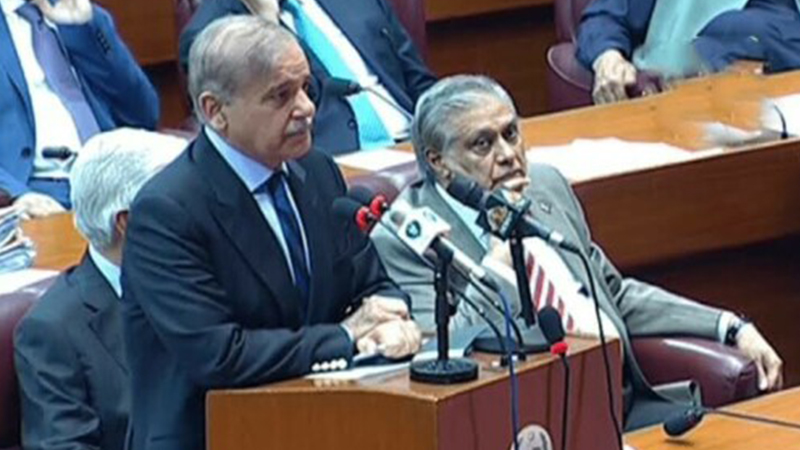Prime Minister Shehbaz Sharif announced that the federal budget for the upcoming fiscal year was developed in partnership with the International Monetary Fund (IMF), reflecting the dire economic realities and circumstances. This confirmation came as Finance Minister Muhammad Aurangzeb unveiled significant revisions to the proposed finance bill for 2024-25.
Speaking in the National Assembly, Prime Minister Sharif addressed concerns raised by a PTI member regarding the socioeconomic issues in South Punjab, taxes on fertilisers, and the burdens on farmers. He expressed optimism about receiving a positive response from the IMF but avoided making any premature statements. PM Sharif assured that any developments from the IMF would be promptly shared with the parliament, hinting at potential relief measures, though it was unclear if he referred to an IMF bailout or specific relaxations concerning fertilisers.
Finance Minister Aurangzeb’s address highlighted several deviations from the initial reform measures announced on June 12, attributed to pressures from influential industrialists and concessions to public sector employees. He disclosed that National Assembly and Senate staff would receive honoraria equivalent to three basic salaries, a move reflecting the government’s efforts to appease parliamentary workers.
Aurangzeb emphasised the necessity of an IMF bailout to achieve a sustainable resolution to the country’s economic and financial challenges. He detailed key changes to the original budget, including the reinstatement of zero sales tax on local sales of export industries and stationery items. To offset the revenue loss, the government slashed allocations for the Public Sector Development Programme (PSDP) by Rs250 billion, redirecting this amount towards Public-Private Partnerships (PPP), which now stands at Rs350 billion. However, this funding shift relies heavily on private sector investment, presenting a significant challenge.
In addition to the PSDP changes, Aurangzeb announced relaxations for hybrid vehicles, the Export Facilitation Scheme 2021, and reiterated the importance of provincial contributions to national expenses and resource mobilisation under a proposed “national financial pact.” He outlined a homegrown reform plan aimed at increasing the tax-to-GDP ratio to 13 per cent, implementing state-owned enterprise reforms, privatisation, and energy sector reforms, all geared towards transitioning from a government-led to a market-driven economy.
Further amendments included provisions for non-filers of income tax, who would now be granted a personal hearing before any punitive measures such as blocking phone SIMs or restricting foreign travel. Changes to the Income Tax Ordinance would clarify the declaration of foreign assets and the assets of a dependent spouse. The finance minister also announced adjustments to the default surcharge on sales tax, income tax, and federal excise duty, aligning it with market rates.
Moreover, Aurangzeb confirmed that stationery items would remain exempt from sales tax, reversing an earlier proposal of a 10pc tax. He also maintained reduced sales tax rates for hybrid electric vehicles and zero rating for local supplies under the Export Facilitation Scheme 2021, a decision anticipated to impact revenue by approximately Rs10 billion.
Addressing fiscal discipline, Aurangzeb revealed stringent measures for non-compliant retailers and distributors, emphasising the expansion of the Federal Board of Revenue’s (FBR) track-and-trace system and the separation of tax policy from administration. He announced significant tax hikes for traders, shopkeepers, and distributors who are non-filers, effective July 1, 2024.
The government, Aurangzeb noted, is committed to austerity and expenditure control, including pension reforms and the potential merger or transfer of federal ministry functions to provinces. He assured that the financial needs of the armed forces and civil armed forces would be met, with security for Chinese workers under the China-Pakistan Economic Corridor (CPEC) being a top priority.
Aurangzeb’s speech, delivered to a sparsely attended assembly, underscored the government’s resolve to navigate the economic crisis through collaborative reform and fiscal prudence, with ongoing updates and stakeholder engagement.
